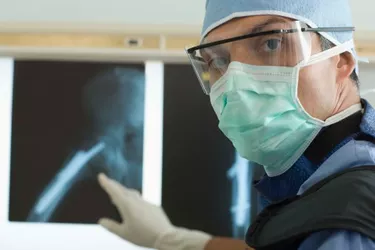
Radiology is a broad profession in which you obtain and interpret images gained through radiology equipment. In this field, you can become a diagnostic radiologist, a radiology assistant, a radiologic technician/technologist or a radiology nurse. Your reasons for entering a radiology career might not be the same reasons someone else has, but some general factors give you an idea of why the profession is in high demand.
Major Entry Reason
Video of the Day
People often enter radiology because they want an interesting job -- they find the challenge of diagnostics fascinating, for example, or they are excited to see what is not visible to the naked eye. According to the American Society of Radiologic Technologists, as many as 97 percent of 2,300 surveyed radiologic technologists cited this as the primary factor for their career choice. Ninety-two percent cited their desire to help people.
Video of the Day
Job Growth
According to the Bureau of Labor Statistics (BLS), professionals in radiology can expect faster than average growth for the field, based on 2008 data. The BLS asserts the industry will increase employment by 17 percent through 2018. Going into radiology is a suitable option for you if you want to be in a profession that has projected stability.
Professional Development
Radiology offers many opportunities for professional development, says the The Society of Radiologists in Training. You have many options for what you can do. For example, you can train in an additional subspecialty like chest radiology, or you can conduct research or teach. This makes it easier to stay in the field despite life changes.
Connection to Clinical Branches
Radiology is connected to virtually all areas of medicine, meaning that it is less dispensable than other medical fields. It is a field in which you have the potential to network with many clinical departments. This makes it possible to develop a well-rounded view of medicine, disease and the human body, because you work for and consult with specialists from multiple disciplines.
Signficance
Depending on your title, as a radiology professional, you might prep patients, operate radiology equipment, get medical histories, record findings and discuss results with other medical workers. Sometimes an accurate diagnosis is possible only through the completion of these tasks, so radiologists often are the key to proper treatment development.
Pay Rate
Radiologists, who are licensed doctors make the most in the field. The BLS indicates that, as of 2009, the average annual salary for physicians was $173,860, or just under $84 per hour. Payscale indicates that radiologists take home anywhere from $48,407 to $203,517, as of 2010. For other radiology professionals such as radiologic technologists, pay is around $54,180, or just over $24 per hour, based on 2009 data from the BLS.